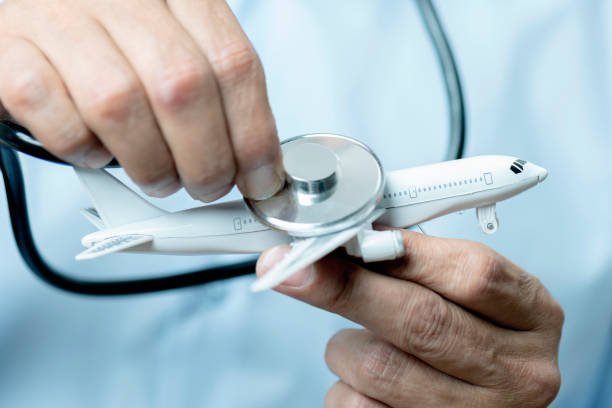Aviation medical Examiners –
Advertisements
Aviation medical examiners are medical professionals who are responsible for ensuring that pilots meet the medical requirements necessary to operate aircraft safely. Aviation medicine is a specialized field of medicine that combines knowledge of aviation physiology, aeromedical factors, and the effects of flight on the human body.
Advertisements
Aviation medical examiners play a crucial role in aviation safety by certifying pilots as medically fit to fly. They are authorized by the Federal Aviation Administration (FAA) to conduct medical examinations and issue medical certificates to pilots.
Types of Medical Certificates
The FAA issues three classes of medical certificates for pilots: first-class, second-class, and third-class. First-class medical certificates are required for commercial airline pilots, while second-class and third-class medical certificates are required for private pilots and student pilots.
Requirements to Become an Aviation Medical Examiner
To become an aviation medical examiner, a medical professional must meet specific eligibility criteria, complete training and certification, and fulfill continuing education requirements.
Eligibility criteria vary depending on the type of medical professional seeking certification. Physicians, physician assistants, and nurse practitioners can become aviation medical examiners, provided they meet certain requirements related to education, licensure, and clinical experience.
Training and certification involve completing a course of study and passing an exam. Continuing education requirements must be met to maintain certification.
Duties of Aviation Medical Examiners
Aviation medical examiners perform a range of duties related to medical certification of pilots. They conduct medical examinations, review medical records, and determine medical eligibility. They also provide medical advice to pilots and other healthcare professionals.
Conducting Medical Examinations
Aviation medical examiners are responsible for conducting medical examinations to determine if pilots meet the medical requirements necessary to operate aircraft safely. The examination includes a comprehensive medical history, a physical examination, and a review of the pilot’s medical records.
Issuing Medical Certificates
Based on the results of the medical examination, aviation medical examiners issue medical certificates to pilots. These certificates confirm that pilots meet the medical requirements necessary to operate aircraft safely.
Reviewing Medical Records
Aviation medical examiners review the medical records of pilots to ensure that they have disclosed all relevant medical information. They also review the medical records of pilots who have previously been issued medical certificates to determine if their medical condition has changed.
Determining Medical Eligibility
Based on the results of the medical examination and a review of the pilot’s medical records, aviation medical examiners determine if pilots meet the medical eligibility criteria for a particular class of medical certificate.
Providing Medical Advice
Aviation medical examiners provide medical advice to pilots and other healthcare professionals regarding aviation-related medical issues. They may provide recommendations regarding the use of medication, the management of medical conditions, and the prevention of medical problems related to aviation.
Common Medical Conditions that Impact Pilot Eligibility
Aviation medical examiners must be knowledgeable about the medical conditions that impact pilot eligibility. Some of the most common medical conditions that impact pilot eligibility include cardiovascular conditions, neurological conditions, respiratory conditions, psychological conditions, and substance abuse and addiction.
Cardiovascular Conditions
Cardiovascular conditions that can impact pilot eligibility include coronary artery disease, heart failure, and arrhythmias. Pilots with these conditions may be required to undergo additional testing and treatment to maintain their medical certification.
Neurological Conditions
Neurological conditions that can impact pilot eligibility include epilepsy, multiple sclerosis, and stroke. Pilots with these conditions may be required to undergo additional testing and treatment to maintain their medical certification.
Respiratory Conditions
Respiratory conditions that can impact pilot eligibility include asthma, chronic obstructive pulmonary disease (COPD), and sleep apnea. Pilots with these conditions may be required to undergo additional testing and treatment to maintain their medical certification.
Psychological Conditions
Psychological conditions that can impact pilot eligibility include depression, anxiety, and bipolar disorder. Pilots with these conditions may be required to undergo additional testing and treatment to maintain their medical certification.
Substance Abuse and Addiction
Substance abuse and addiction can have a significant impact on pilot eligibility. Pilots with a history of substance abuse or addiction may be required to undergo evaluation and treatment before being considered for medical certification.
Challenges Faced by Aviation Medical Examiners
Aviation medical examiners face several challenges related to the certification of pilots. These challenges include keeping up with regulations and guidelines, balancing safety and pilot health, and communicating with pilots and other healthcare professionals.
Keeping Up with Regulations and Guidelines
Aviation medicine is a rapidly evolving field, and aviation medical examiners must stay up to date with the latest regulations and guidelines related to pilot medical certification.
Balancing Safety and Pilot Health
Aviation medical examiners must balance the need for aviation safety with the health and well-being of pilots. They must make difficult decisions regarding pilot eligibility while ensuring that the public is protected.
Communicating with Pilots and Other Healthcare Professionals
Aviation medical examiners must effectively communicate with pilots and other healthcare professionals regarding aviation-related medical issues. They must be able to provide clear and concise medical advice while also taking into account the unique demands of aviation.
Conclusion
Aviation medical examiners play a crucial role in aviation safety by ensuring that pilots meet the medical requirements necessary to operate aircraft safely. They must have a thorough understanding of aviation physiology, aeromedical factors, and the effects of flight on the human body.
Becoming an aviation medical examiner requires meeting specific eligibility criteria, completing training and certification, and fulfilling continuing education requirements. Aviation medical examiners perform a range of duties related to medical certification of pilots, including conducting medical examinations, reviewing medical records, and determining medical eligibility.
Aviation medical examiners face several challenges related to the certification of pilots, including keeping up with regulations and guidelines, balancing safety and pilot health, and communicating with pilots and other healthcare professionals.
Aviation Medical Examiners Near Me
Click here to find aviation medical examiners near you.

Abdulrahman Buhari is a seasoned website content writer renowned for his profound expertise in Search Engine Optimization (SEO). Over the span of his career, he has masterfully crafted over 2,000 blog articles across a variety of websites, solidifying his place as a respected figure in content optimization. Abdulrahman is currently studying as a Pharm D. student at the University of Ilorin, Nigeria. Beyond his academic endeavors, he exhibits a genuine passion for crafting content tailored to satisfy the search intent of Google users. Hailing from the Nupe tribe, Abdulrahman has honed his skills in SEO for half a decade, consistently delivering excellence.
Advertisements
